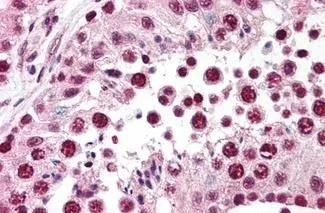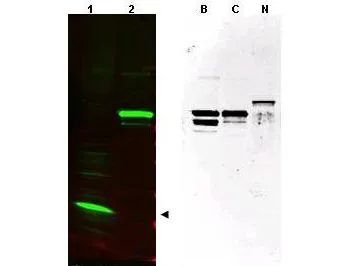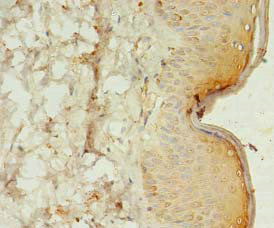
IHC-P analysis of human testis tissue using GTX85701 SPANXC antibody. Antigen retrieval : Heat-induced antigen retrieval Dilution : 5 μg/ml
SPANXC antibody
GTX85701
ApplicationsWestern Blot, ELISA, ImmunoHistoChemistry, ImmunoHistoChemistry Paraffin
Product group Antibodies
ReactivityHuman
TargetSPANXC
Overview
- SupplierGeneTex
- Product NameSPANXC antibody
- Delivery Days Customer9
- Application Supplier NoteWB: 1:500-1:3000. IHC-P: 5 microg/ml. ELISA: 1:10000-1:50000. *Optimal dilutions/concentrations should be determined by the researcher.Not tested in other applications.
- ApplicationsWestern Blot, ELISA, ImmunoHistoChemistry, ImmunoHistoChemistry Paraffin
- CertificationResearch Use Only
- ClonalityPolyclonal
- Concentration1 mg/ml
- ConjugateUnconjugated
- Gene ID64663
- Target nameSPANXC
- Target descriptionSPANX family member C
- Target synonymsCT11.3, CTp11, SPANX-C, SPANX-E, SPANXE, sperm protein associated with the nucleus on the X chromosome C, Nuclear-associated protein SPAN-Xe, SPAN-Xc protein, Sperm protein associated with the nucleus on the X chromosome E, cancer-testis-associated protein CTp11, cancer/testis antigen 11.3, cancer/testis antigen family 11, member 3, cancer/testis-associated protein of 11 kD, nuclear-associated protein SPAN-Xc, sperm protein associated with the nucleus, X chromosome, family member C
- HostRabbit
- IsotypeIgG
- Protein IDQ8TAD1
- Protein NameSperm protein associated with the nucleus on the X chromosome C
- Scientific DescriptionTemporally regulated transcription and translation of several testis-specific genes is required to initiate the series of molecular and morphological changes in the male germ cell lineage necessary for the formation of mature spermatozoa. This gene is a member of the SPANX family, which is located in a gene cluster on chromosome X. The SPANX genes encode differentially expressed testis-specific proteins that localize to various subcellular compartments. This particular gene encodes a protein that localizes to the nucleus and is expressed in highly metastatic cell lines, making the protein a potential diagnostic and prognostic marker. The protein belongs to a family of cancer/testis antigens and represents a potential target for cancer immunotherapy. [provided by RefSeq, Jul 2008]
- ReactivityHuman
- Storage Instruction-20°C or -80°C,2°C to 8°C
- UNSPSC41116161





![Western blot using GeneTex's Protein A purified anti-SPANX-C antibody shows detection of a band at ~17 kDa corresponding to SPANX-C present in a nuclear extract from VWM105 cells (left panel, arrowhead). VWM105 cells are derived from a human melanoma and are positive for SPANX proteins. Lane 2 shows reactivity with a purified recombinant SPANX-C fusion protein. The right panel shows similar reactivity with purified recombinant SPANX-B, SPANX-C and SPANX-N proteins. Proteins were separated by SDS-PAGE, transferred to nitrocellulose, and probed with the primary antibody diluted to 1:1,000. IRDye?800 conjugated goat anti-Rabbit IgG [H&L] was used (left). IRDye is a trademark of LI-COR, Inc. Size estimation was made by comparison to prestained MW markers as indicated.](https://www.genetex.com/upload/website/prouct_img/normal/GTX48817/GTX48817_20160330_WB_w_23060823_289.webp)